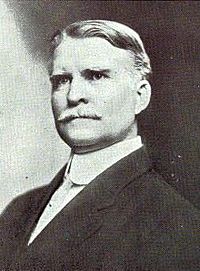Lawrence Tyson
| Lawrence Tyson | |
|---|---|

Tyson, photographed by Knaffl and Brakebill
|
|
|
United States Senator from Tennessee |
|
|
In office March 4, 1925 – August 24, 1929 |
|
| Preceded by | John K. Shields |
| Succeeded by | William E. Brock |
| Speaker of the Tennessee House of Representatives | |
|
In office 1903 – 1905 |
|
| Preceded by | Edgar B. Wilson |
| Succeeded by | William K. Abernathy |
| Personal details | |
| Born |
Lawrence Davis Tyson July 4, 1861 Pitt County, North Carolina |
| Died | August 24, 1929 (aged 68) Strafford, Pennsylvania |
| Nationality | American |
| Political party | Democratic |
| Spouse(s) | Bettie Humes McGhee |
| Children | Charles McGhee Tyson Isabella Tyson (Gilpin) |
| Alma mater |
U.S. Military Academy West Point, New York, USA |
| Occupation | Soldier, politician |
| Religion | Episcopalian |
| Awards |
|
| Military service | |
| Service/branch |
U.S. Army Tennessee National Guard |
| Years of service | 1883–1896, 1898–1899, 1900–1906, 1917–1919 |
| Rank |
|
| Commands | 6th Regiment U.S. Volunteer Infantry (1898–1899), 59th Brigade, 30th Infantry Division (1917–1919) |
| Battles/wars | Apache Wars, Spanish–American War, World War I |
Lawrence Davis Tyson (July 4, 1861 – August 24, 1929) was an American general, politician and textile manufacturer, operating primarily out of Knoxville, Tennessee, during the late 19th and early 20th centuries. He commanded the 59th Brigade of the 30th Infantry Division during World War I, and served as a Democratic United States Senator from Tennessee from 1925 until his death. Tyson also helped organize the Knoxville Cotton Mills in the early 20th century, and served as president of the second Appalachian Exposition in 1911.
A graduate of West Point, Tyson first saw military action during the Apache Wars in the 1880s. He moved to Knoxville in 1891 to teach military science at the University of Tennessee, and commanded the 6th Regiment, Tennessee Volunteer Infantry during the Spanish–American War. From 1902 to 1908, Tyson served in the Tennessee House of Representatives, and was Speaker of the House from 1903 to 1905. During the Meuse-Argonne Offensive of World War I, the 59th Brigade, under Tyson's leadership, became one of the first Allied brigades to break through the Hindenburg Line.
Tyson was born on the farm of his parents, Richard Lawrence Tyson and Margaret Turnage, near Greenville in Pitt County, North Carolina near the Tar River in the Tidewater region. He graduated from the Greenville Academy, and initially worked as a clerk in Salisbury. In 1878, he scored the highest in his region on a competitive entrance exam for the United States Military Academy at West Point, and was admitted the following year. Upon graduation in 1883, Tyson was commissioned as a second lieutenant, and took part in the Apache Wars against a Geronimo-led faction of Apaches in the West.
...
Wikipedia
